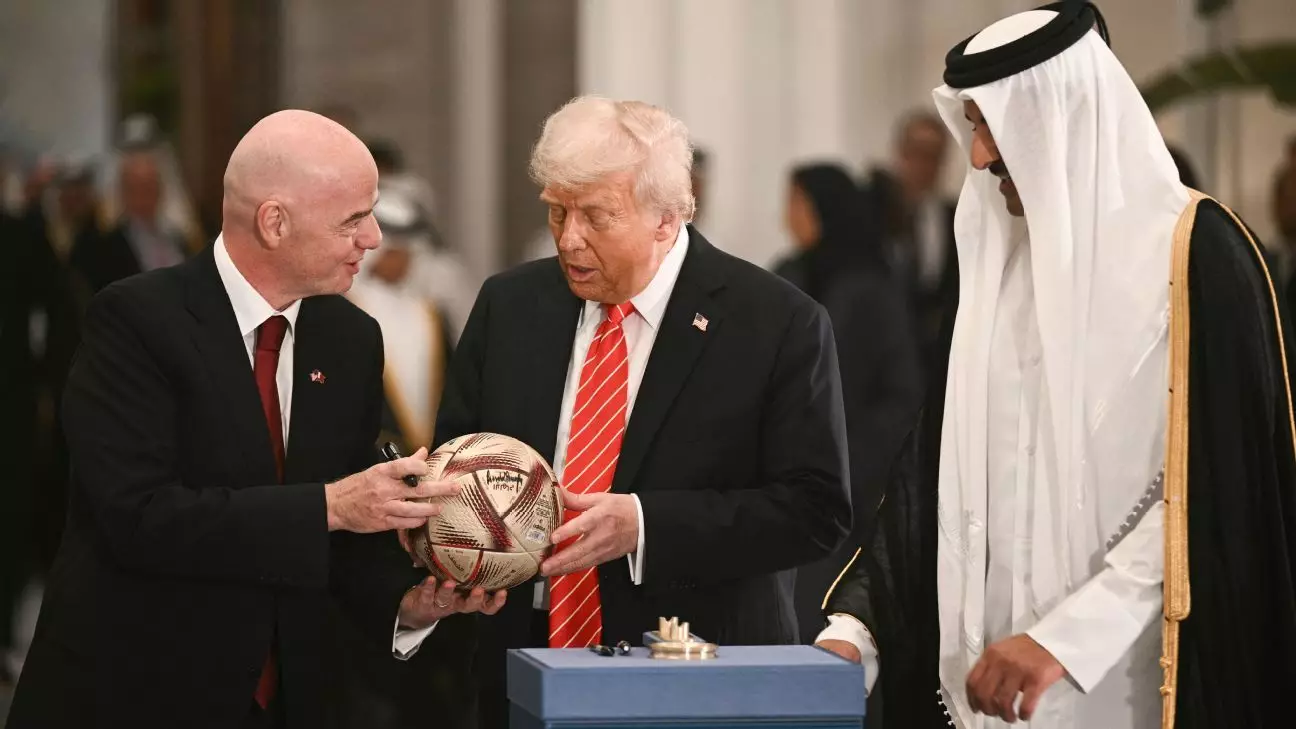In the world of sports, timing is everything, yet the arrival of FIFA president Gianni Infantino to the annual meeting of soccer’s governing body raises questions about priorities and the implications of geopolitical relationships. Infantino’s late arrival to the gathering in Asuncion, Paraguay, for what was meant to be an essential strategic discussion among the 211 member federations highlighted the complexities of balancing international diplomacy with the responsibilities of leading a global sports organization. The fiasco of his delayed flight, which included a convoluted route via Nigeria, set the tone for an event marred by tension and an apparent lack of cohesion among key leaders in global soccer.
Candidate for Leadership?
While Infantino was busy establishing relationships with political figures—most notably joining U.S. President Donald Trump on state visits to the Middle East—it begs the question of whether his role as FIFA president should lean more heavily on sports governance rather than political allegiances. As Infantino himself noted, “as president of FIFA, my responsibility is to make decisions in the interests of the organization,” yet one must wonder if political relationships are overshadowing the very essence of soccer governance. The fact that Infantino viewed his presence at political gatherings as paramount suggests a troubling shift in priorities; the ethos of soccer, after all, is about passion, community, and inclusivity, and these may be sacrificed at the altar of international relations.
European Discontent
The fallout from Infantino’s tardiness manifested not only in his apologies but also in the early departures of senior European officials from the meeting. Notably, UEFA president Aleksander Ceferin’s exit, whether driven by scheduling conflicts or discontent with Infantino’s commitment to punctuality, underscores the fissures within FIFA’s leadership. This incident brings to light a critical dilemma: the growing rift between European soccer powers and FIFA. As UEFA positions itself as a champion of tradition and integrity in soccer governance, it stands in stark contrast to an increasingly politicized FIFA. The exodus of UEFA representatives from the meeting was not merely a procedural footnote; it signals deeper tensions that could eventually reverberate throughout the sport.
Paraguay’s Mixed Blessings
Despite the chaos, President Santiago Peña of Paraguay attempted to frame the situation positively, declaring Infantino a “personal friend” while also hinting at the country’s burgeoning role in the soccer world. Paraguay is set to co-host matches for the 2030 World Cup alongside Spain, Portugal, and Morocco—an ambitious goal that reflects the nation’s hopes of leveraging soccer for greater global recognition. However, Peña’s commendations come against a backdrop of uncertainty; will FIFA’s evolving political ties help or hinder the developmental aspirations of nations like Paraguay? More so, it raises questions about the criteria for securing major events—are they awarded based on merit and sporting credentials, or do political allegiances play an outsized role?
Further Implications on Global Governance in Soccer
Infantino’s political maneuvers extend beyond individual relationships and impact the global governance of soccer itself. With his ties to the Trump administration, the optics of FIFA aligning with contentious political figures evoke skepticism and could alienate member federations conflicted in their
own domestic climates. As nations grapple with their political realities, decisions made at the FIFA level can have cascading effects on the sport as a whole. This blend of politics and sports management creates a precarious situation, where decisions may serve as extensions of political strategies rather than true missions to uplift and promote the beautiful game.
The Weight of the World Cup Trophy
Interestingly, the trophy associated with the Club World Cup, which debuted prominently in Congress despite the disarray at the meeting, represents the tangible impact of FIFA’s political connections. While Infantino’s engagement with political figures initially appears beneficial, one has to consider the long-term ramifications on FIFA’s image and the integrity of its governance. The prominence of the trophy in high political spaces suggests an intertwining of sports and state that could overshadow the values FIFA is meant to uphold. As a symbol of success and achievement, how that trophy is showcased may very well reflect how the public perceives FIFA’s commitment to the sport as separate from the sway of political power.
In navigating between the sports realm and political environments, Infantino’s actions demonstrate the complexities that come with leadership in today’s global landscape. The meeting in Paraguay should have been a unifying event, but his tardiness and the political overtones injected into FIFA highlight ongoing challenges that threaten to reshape the future of soccer governance. While Infantino may aim to reconcile these worlds for the benefit of soccer, the question remains: at what cost?

Leave a Reply